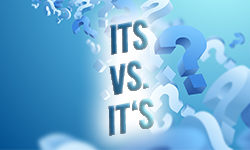
When writing an academic paper, it is typical to come across commonly confused words. These incidents can affect the quality of your paper, as academic writing necessitates clarity and precision to effectively communicate arguments. The words “its” and “it’s” are often a source of confusion, as they have similar spellings. Consequently, many writers use them interchangeably, even though they cannot be substituted for one another. Learn the difference between “its” vs. “it’s” now.
Definition of “its vs. it’s”
Although “its” and “it’s” differ only by one sign and entail similar meanings, they represent some of the most often confused words in academic writing. The core meaning of both words refers to a change or impact, however, they refer to different parts of speech.
Its
… is a possessive pronoun used to show ownership or possession of something that is neither male nor female.
It’s
… is a contraction of “it is” or “it has” and is used to represent a singular, non-gender-specific subject.
To distinguish between the two words, it is important to focus on the context. If you aim to indicate possession or ownership by something that is neither male nor female, you use “its.” If you can replace “it’s” with “it is” or “it has” in a sentence, then you should use the contraction “it’s.”
Using the word “its”
The word “its” is only used as a possessive pronoun. This will be outlined in the following.
“Its” as a pronoun
“Its” functions as a possessive pronoun in English grammar. It is used to show that something belongs to or is associated with a singular, non-gender-specific noun.
Tip for using “its” correctly
There are no direct synonyms for “its” as a possessive pronoun. “Its” is a unique pronoun used specifically to indicate possession or ownership of something that is neither male nor female. There are no other pronouns that serve this exact function in English.
Using the word “it’s”
The word “it’s” only used as a contraction. This grammatical function will be outlined in the following.
“It’s” as a contraction
“It’s” is a contraction of the two words “it” and “is” or “it” and “has.” It is used to represent a singular, non-gender-specific subject and the present tense of the verb “to be” (is) or to indicate a past action (has).
Tip for using “it’s” correctly
Except for using the long versions of “it’s”, namely “it is” and “it has”, there are no synonyms for the word. Just like “its”, the contraction serves a unique grammatical function that cannot be replaced.
Test yourself!
Practice sheet
To test your ability to differentiate between “its” and “it’s”, complete the 10 sentences by filling in the blank spaces. Afterward, refer to the second tab for the correct answers to confirm your comprehension.
- ___ been a long day at work.
- The cat groomed ___ fur meticulously.
- ___ essential to finish the project on time.
- The dog wagged ___ tail happily.
- ___ difficult to believe how fast time flies.
- The baby smiled in ___ sleep.
- ___ been a pleasure meeting you.
- ___ time to go to the party?
- The car lost ___ brakes suddenly.
- ___ time for us to leave now.
- It has been a long day at work.
- The cat groomed its fur meticulously. (The fur of the cat)
- It is essential to finish the project on time.
- The dog wagged its tail happily. (The tail of the dog)
- It is difficult to believe how fast time flies.
- The baby smiled in its sleep. (The sleep of the baby)
- It has been a pleasure meeting you.
- Is it time to go to the party?
- The car lost its brakes suddenly. (The brakes of the car)
- It is time for us to leave now.
FAQs
Use “its” when you want to show that something belongs to or is associated with something else. Use “it’s” when you want to form the present tense of “it is” or the present perfect tense of “it has.”
The apostrophe in “it’s” represents the missing letters from “it is” or “it has.” So, whenever you encounter “it’s” in a sentence, mentally expand it to “it is” or “it has.” If the expanded form makes sense in the sentence, then “it’s” is the correct choice.
“Its” is a possessive pronoun, indicating that something belongs to or is associated with a non-specific gender-neutral object or animal.
“It’s” is a contraction of two words: “it” and “is” or “it” and “has.” The apostrophe represents the omission of the letter “i” in “is” or “ha” in “has.”
